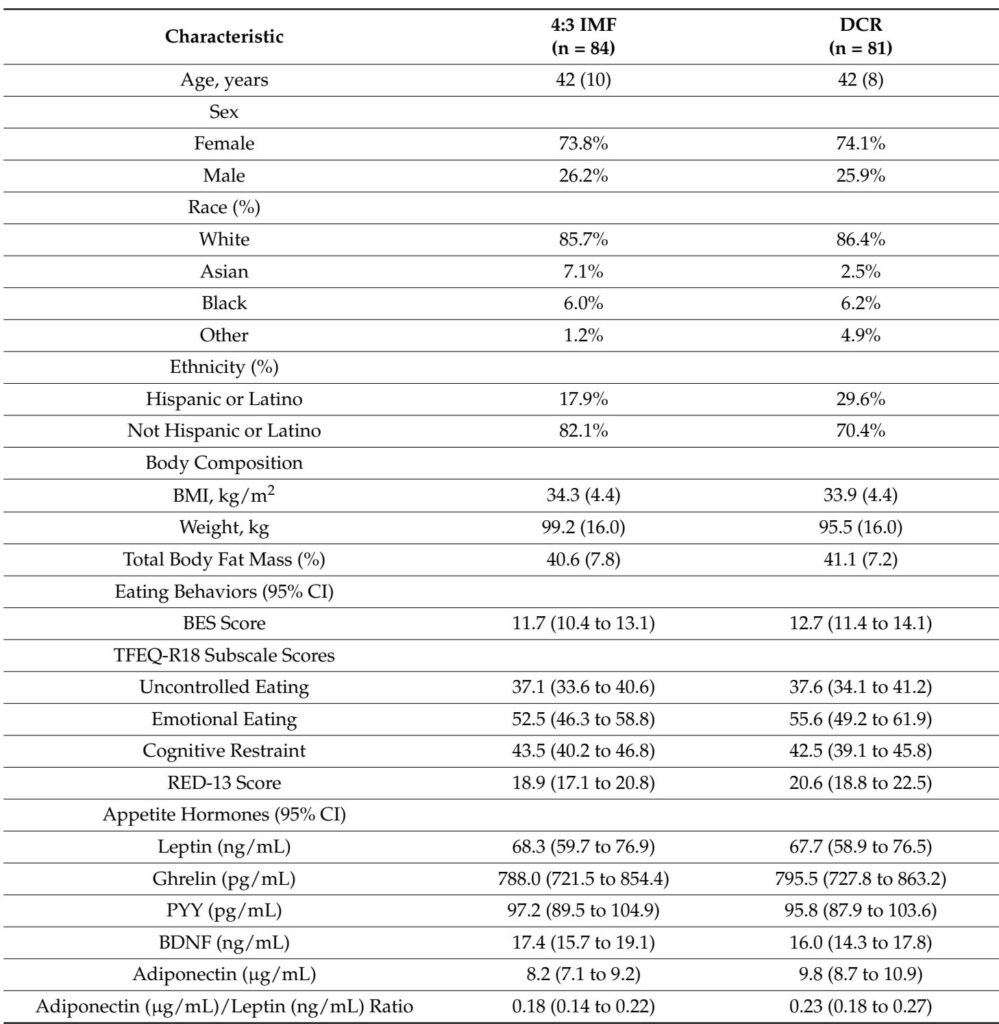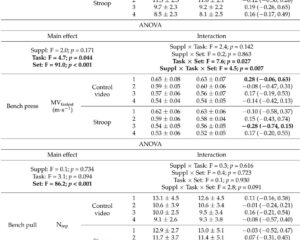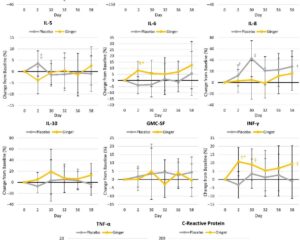Introduction
Obesity continues to be a leading global health challenge, necessitating effective long-term weight loss strategies. Daily caloric restriction (DCR), while widely prescribed, often encounters adherence limitations due to metabolic adaptations and maladaptive eating behaviors such as binge and uncontrolled eating. Intermittent fasting (IMF) regimens, characterized by periodic energy restriction, have gained popularity as potentially more sustainable diet modalities. Among these, the 4:3 IMF — involving three non-consecutive fasting days with substantial energy reduction — may afford greater diet flexibility and adherence compared to DCR. However, the behavioral and physiological mechanisms underlying the weight loss benefits of 4:3 IMF versus DCR remain insufficiently understood, particularly over extended periods.
Study Design
This secondary analysis derives from a 12-month randomized clinical trial conducted at the University of Colorado Anschutz Medical Campus, enrolling 165 adults aged 18–60 years with overweight or obesity. Participants were randomized to either a 4:3 intermittent fasting regimen or daily caloric restriction, both targeting an equivalent weekly energy deficit of approximately 34.3%. Both groups received structured, group-based behavioral counseling and were advised to increase moderate-intensity aerobic exercise to 300 minutes weekly.
Eating behaviors were evaluated at baseline, 3, 6, and 12 months using validated instruments: the Three-Factor Eating Questionnaire-Revised 18 (TFEQ-R18) assessing uncontrolled eating, emotional eating, and cognitive restraint; the Binge Eating Scale (BES); and the Reward-Based Eating Drive Scale (RED-13). Fasting levels of appetite-regulating hormones — leptin, ghrelin, peptide YY (PYY), brain-derived neurotrophic factor (BDNF), and adiponectin — were measured at baseline, 6, and 12 months.
Key Findings
After 12 months, the 4:3 IMF group showed significant reductions in binge eating behaviors and uncontrolled eating scores compared to the DCR group, which exhibited increases in these maladaptive behaviors (p < 0.01 for group-by-time interactions). Emotional eating and reward-based eating decreased over time in both groups, with the 4:3 IMF group sustaining greater improvements. Cognitive restraint increased in both groups, though the DCR group showed a more pronounced early rise at 3 months.
Correlation analyses within the 4:3 IMF group revealed that greater weight loss was associated with reductions in uncontrolled eating (r = -0.27, p = 0.03) and emotional eating (r = -0.37, p < 0.01), as well as increases in cognitive restraint (r = 0.35, p < 0.01). Conversely, in the DCR group, weight loss correlated only with increased cognitive restraint.
Regarding appetite hormones, no significant differences emerged between groups for changes in leptin, ghrelin, PYY, BDNF, or adiponectin over 12 months. Both groups exhibited expected metabolic adaptations to weight loss: decreased leptin and increased ghrelin levels. The adiponectin/leptin ratio improved modestly in both groups, indicative of better adipose tissue function.
Expert Commentary
These findings provide compelling evidence that 4:3 IMF may foster superior behavioral adaptations, namely reductions in binge and uncontrolled eating, that facilitate greater long-term weight loss compared to DCR. The flexible fasting schedule and self-selected fasting days likely reduce psychological stress and perceived deprivation, mitigating maladaptive eating behaviors often exacerbated by daily calorie counting. The dissociation between behavioral improvements and hormonal profiles suggests that psycho-behavioral factors may play a more pivotal role in mediating the enhanced adherence and outcomes seen with 4:3 IMF. However, limitations include the absence of postprandial hormone measurements, which could better characterize dynamic appetite regulation, and the predominance of middle-aged, female, non-Hispanic White participants limiting broader generalizability.
Conclusions
In conclusion, the 4:3 intermittent fasting regimen demonstrates advantageous modifications in maladaptive eating behaviors over 12 months compared to daily caloric restriction, coinciding with greater weight loss. These behavioral improvements, rather than changes in fasting appetite-related hormones, may underlie the superior efficacy of 4:3 IMF. Future research should incorporate more granular assessments of appetite hormone dynamics and neurocognitive reward pathways to delineate mechanisms. Clinicians should consider 4:3 IMF as a flexible, behaviorally supportive strategy for sustainable obesity management, particularly where concerns regarding binge or uncontrolled eating exist.
References
Breit MJ, Caldwell AE, Ostendorf DM, Pan Z, Creasy SA, Swanson B, Clark K, Hill EB, MacLean PS, Bessesen DH, Melanson EL, Catenacci VA. Effects of 4:3 Intermittent Fasting on Eating Behaviors and Appetite Hormones: A Secondary Analysis of a 12-Month Behavioral Weight Loss Intervention. Nutrients. 2025 Jul 21;17(14):2385. doi: 10.3390/nu17142385 . PMID: 40733010; PMCID: PMC12298406.
Catenacci, V.A., Ostendorf, D.M., Pan, Z., Kaizer, L.K., Creasy, S.A., Zaman, A., Caldwell, A.E., Dahle, J., Swanson, B., Breit, M.J., et al. The Effect of 4:3 Intermittent Fasting on Weight Loss at 12 Months: A Randomized Clinical Trial. Ann. Intern. Med. 2025, 178, 634–644.
Jensen, M.D., Ryan, D.H., Apovian, C.M., Ard, J.D., Comuzzie, A.G., Donato, K.A., Hu, F.B., Hubbard, V.S., Jakicic, J.M., Kushner, R.F., et al. 2013 AHA/ACC/TOS guideline for the management of overweight and obesity in adults. Circulation 2014, 129, S102–S138.
Sumithran, P., Prendergast, L.A., Delbridge, E., Purcell, K., Shulkes, A., Kriketos, A., Proietto, J. Long-term persistence of hormonal adaptations to weight loss. N. Engl. J. Med. 2011, 365, 1597–1604.
Hoddy, K.K., Kroeger, C.M., Trepanowski, J.F., Barnosky, A.R., Bhutani, S., Varady, K.A. Safety of alternate day fasting and effect on disordered eating behaviors. Nutr. J. 2015,14, 44.


